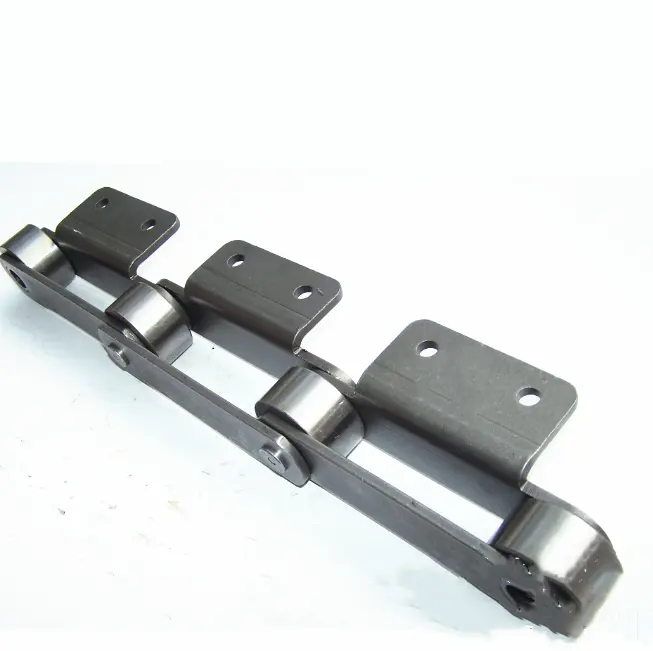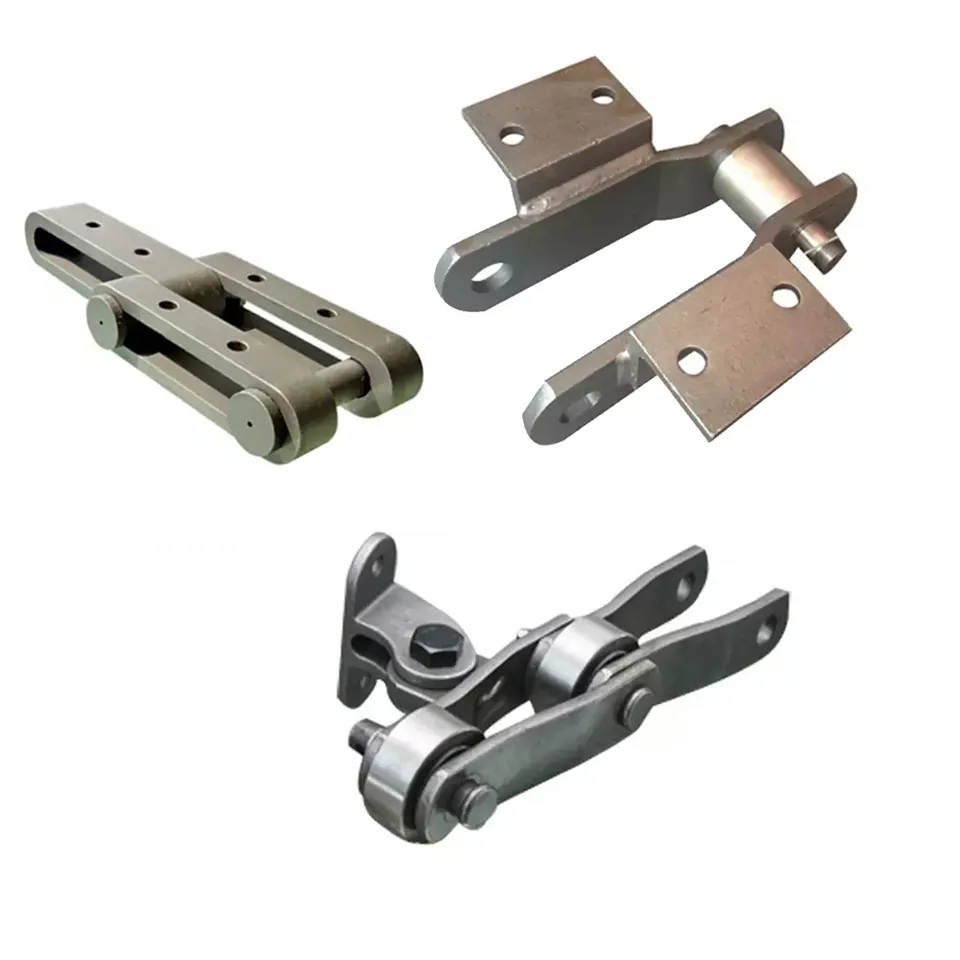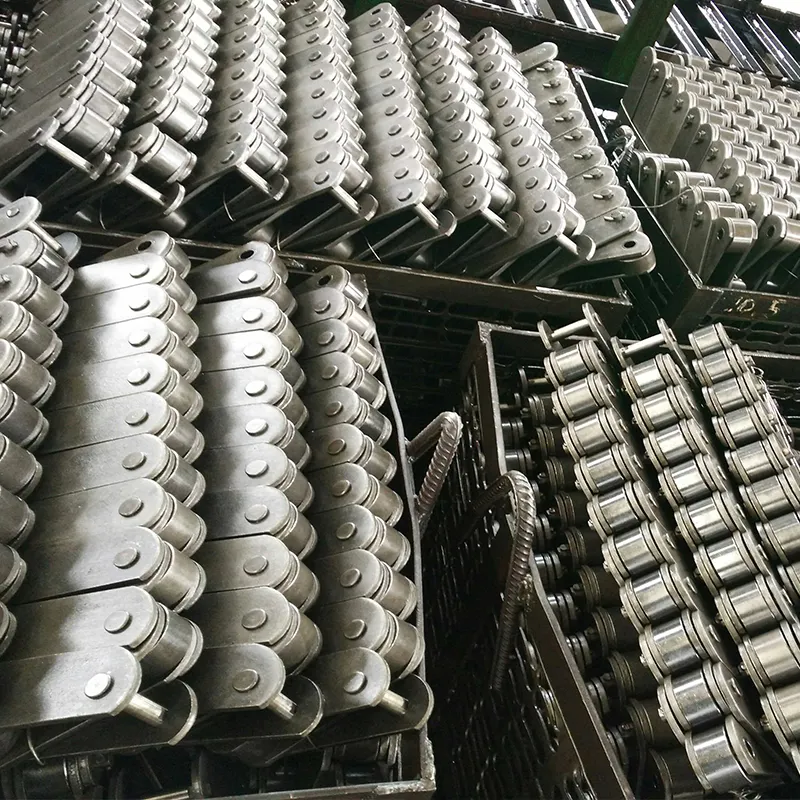Product Description
Conveyor chains for paper mill
conveyor chains with V-shaped top plates are used almost exclusively to handle paper rolls. The outboard rollers have a wider wheel gauge and provide more stability for the rolls.
conveyor chains are primarily used for handling paper rolls. Typically the conveyors are long and handling large or heavy loads requiring a heavy-duty chain as well.
Conveyor chains is widely used in Food,Forest Paper,Logistics Transportation,Packaging Machinery,Building Materials Machinery ,Environmental Protection and other other industries.
Typical products:
short pitch roller chain, double pitch conveyor chain, free flow chain, wood conveyor chain, long pitch conveyor chain, meat production line conveyor chain, food packaging machinery chain, hollow pin chain and accessories.
The paper roll conveying chain is a special conveying chain for the paper processing industry, which can provide various top plates with surface protection treatment according to working conditions; The main products are the P63 series and the P63.5 series.
The product has high strength, stable operation, and low noise using high-quality materials and advanced processing technology.
| Conveyor chains for paper mill |
63PF4 |
| 63PF2
|
63PF5 |
Please contact us for details.
| Standard or Nonstandard: | Standard |
|---|---|
| Application: | Conveyer Equipment |
| Surface Treatment: | Polishing |
| Structure: | Roller Chain |
| Material: | Alloy |
| Type: | Double Pitch Chain |
| Samples: |
US$ 100/Meter
1 Meter(Min.Order) | |
|---|
| Customization: |
Available
| Customized Request |
|---|

How do mill chains handle material flow and transfer in bulk handling applications?
Mill chains are specifically designed to handle material flow and transfer in bulk handling applications with efficiency and reliability. These chains are widely used in various industries, such as agriculture, mining, construction, and more, where bulk materials need to be transported in large quantities. Here’s how mill chains achieve material flow and transfer:
1. Robust Construction: Mill chains are constructed using high-quality materials, such as alloy steel, which provides excellent strength and durability. Their robust design allows them to handle heavy loads and withstand the stresses of continuous material transfer.
2. Precise Alignment: The design of mill chains ensures precise alignment between the chain and sprockets. This alignment helps to maintain a smooth and consistent material flow, reducing the risk of jams or blockages in the system.
3. Flexibility: Mill chains are flexible enough to adapt to various conveyor configurations, including inclined or declined conveyors. This flexibility enables them to efficiently transport materials across different terrains and elevations.
4. Low Friction: Mill chains are designed to minimize friction during operation. This low friction characteristic reduces the energy consumption and wear on the chain, resulting in a longer service life and improved material transfer efficiency.
5. Adaptability: Mill chains are suitable for handling a wide range of bulk materials, including grains, aggregates, ores, coal, wood chips, and more. Their adaptability makes them a versatile choice for different industries.
6. Conveyor Systems: In bulk handling applications, mill chains are commonly used in conveyor systems. These systems utilize rotating sprockets to move the chain, and the material is carried along the conveyor’s path, ensuring a continuous flow of materials from one point to another.
7. Bucket Elevators: Mill chains are often employed in bucket elevators, which lift and transfer bulk materials vertically. The buckets attached to the chain scoop up the material and discharge it at the desired location, providing an efficient material handling solution.
Overall, mill chains are essential components in bulk handling applications, ensuring the smooth and consistent flow of materials in various industrial processes. Their reliable performance, strength, and adaptability make them a preferred choice for material transfer in many industries.

What are the safety considerations when using mill chains in industrial settings?
Safety is of utmost importance when using mill chains in industrial settings. Proper maintenance, installation, and operation are crucial to ensure the safe and efficient functioning of the equipment. Here are some key safety considerations:
1. Training and Education: Workers operating and maintaining the mill chains should receive proper training and education on equipment handling, safety protocols, and emergency procedures.
2. Personal Protective Equipment (PPE): Operators and maintenance personnel should wear appropriate PPE, such as safety gloves, safety goggles, and protective clothing, to prevent injuries during handling and maintenance.
3. Regular Inspections: Conduct routine inspections of the mill chains to identify any signs of wear, damage, or malfunction. Address any issues promptly to avoid potential accidents.
4. Lubrication: Proper and regular lubrication of the mill chain is essential to reduce friction and wear. However, ensure that lubricants used are compatible with the application and do not pose any health hazards.
5. Load Capacity: Do not exceed the recommended load capacity of the mill chain. Overloading can lead to premature failure and accidents.
6. Guarding: Install appropriate guards and safety devices to prevent accidental contact with moving parts of the mill chain and reduce the risk of entanglement.
7. Emergency Stop Devices: Equip the mill chain system with emergency stop devices that allow workers to quickly halt the operation in case of emergencies or potential hazards.
8. Handling Hazardous Materials: If the mill chain is used in handling hazardous materials, ensure that proper containment and safety measures are in place to prevent spills and exposures.
9. Environmental Considerations: Be mindful of the environmental impact of using mill chains. Follow proper waste disposal procedures and consider eco-friendly alternatives when applicable.
10. Compliance with Regulations: Ensure that the mill chains and associated equipment comply with relevant safety regulations and standards set by regulatory authorities.
By adhering to these safety considerations and maintaining a proactive safety culture, the risk of accidents and injuries in industrial settings can be significantly reduced, creating a safer and more productive work environment.

How does a mill chain differ from other types of conveyor chains?
Mill chains, also known as industrial chains or conveyor chains, have several distinct features that set them apart from other types of conveyor chains. Here are some key differences:
1. Design and Construction: Mill chains are specifically designed for heavy-duty industrial applications, such as steel production, lumber handling, mining, and more. They are built with robust construction and larger link plates to handle heavy loads and resist wear and tear.
2. Attachment Type: Mill chains often come with various attachment options, such as extended pins, K attachments, or slotted attachments. These attachments allow the chain to engage with the conveyed materials and provide a secure and efficient method of transporting them.
3. Material: Mill chains are commonly made from high-quality materials, such as carbon steel or stainless steel. This choice of material ensures durability, resistance to corrosion, and the ability to withstand harsh operating conditions.
4. Application: While some other types of conveyor chains are suitable for lighter-duty applications, mill chains are specifically designed for heavy-duty and high-stress industrial applications. They are commonly used in industries like steel mills, lumber processing, mining, and other heavy industries.
5. Load Capacity: Due to their robust design and construction, mill chains have a higher load capacity compared to standard conveyor chains. This allows them to handle large and heavy materials in industrial settings.
6. Speed: Mill chains are typically used in applications where the conveying speed is slower compared to some other types of conveyor chains. The focus is on moving heavy materials with precision and control rather than achieving high conveying speeds.
Overall, mill chains are engineered for heavy-duty and demanding applications that require reliable and efficient material handling. They are a crucial component in various industrial processes, providing smooth and controlled movement of materials in challenging environments.


editor by CX 2023-08-31